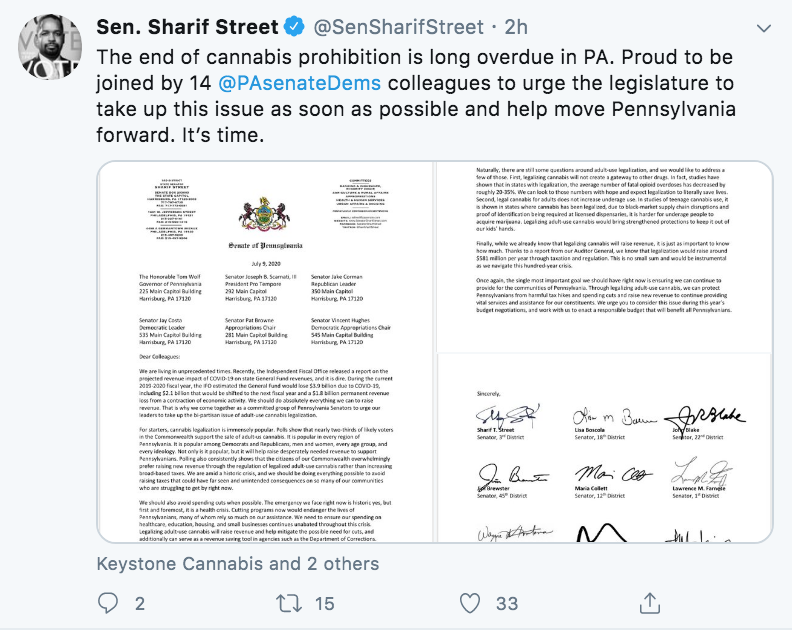The Cannabis Wire Daily newsletter is sent to C-Wire Plus subscribers every weekday morning at 7 a.m. Excerpts are published here later in the day. Don’t miss the full picture. Subscribe now.
The Biden-Sanders Unity Task Force does not recommend legalization.
Months after the formation of the task force, which aims to bring together supporters of Bernie Sanders and Joe Biden to craft policy recommendations as Biden goes head-to-head with Trump ahead of the 2020 presidential elections, its recommendations have been released.
And despite Sanders’ longtime support for cannabis legalization, and the rising popularity of legalization among Democrats and Republicans alike, a federal plan for legalization was not included. Instead, the focus is on decriminalization and expungement at the federal level, while maintaining a hands-off approach to states that choose to go further and establish an industry for medical or adult use, which has been more or less the approach at the federal level for nearly a decade. This approach would leave many of the issues that exist as a result of federal cannabis laws, such as access to banking, unresolved.
The recommendation reads: “Substance use disorders are diseases, not a crimes. Democrats believe no one should be in prison solely because they use drugs. Democrats will decriminalize marijuana use and reschedule it through executive action on the federal level. We will support legalization of medical marijuana, and believe states should be able to make their own decisions about recreational use. The Justice Department should not launch federal prosecutions of conduct that is legal at the state level. All past criminal convictions for cannabis use should be automatically expunged. And rather than involving the criminal justice system, Democrats support increased use of drug courts, harm reduction interventions, and treatment diversion programs for those struggling with substance use disorders.”
FDA shares CBD research with Congress.
As we reported in our newsletter earlier this week, proposed House budget legislation includes funding for the US Food and Drug Administration to better regulate CBD, which the FDA has long been calling for.
Also this week, the FDA sent a report to the U.S. House Committee on Appropriations and the U.S. Senate Committee on Appropriations, titled “Sampling Study of the Current Cannabidiol Marketplace to Determine the Extent That Products are Mislabeled or Adulterated.”
This was to fulfill a requirement resulting from the enactment in December of the Further Consolidated Appropriations Act, 2020, which provided the FDA funding and, in an “accompanying Joint Explanatory Statement directed FDA to conduct a sampling study” within 180 days.
Some findings from testing conducted in 2020:
“Of the 200 products purchased, testing for cannabinoids was completed on 147 of them … Of the 147 products tested, 138 products (94 percent) contained CBD. Of the samples that did not contain CBD (n = 9), seven either did not indicate CBD or clearly indicated ‘zero CBD’ on the label. Two products that listed CBD on the label were not found to contain CBD.
For products that indicated a specific amount of CBD, those amounts were compared to the testing results. Of the 102 products that indicated a specific amount of CBD, 18 products (18 percent) contained less than 80% of the amount of CBD indicated, 46 products (45 percent) contained CBD within 20 percent of the amount indicated, and 38 products (37 percent) contained more than 120 percent of the amount of CBD indicated.
THC levels in the products tested ranged from below the LOQ to 3.1 mg/serving, with 72 products (49 percent) found to contain THC or THCA at concentrations above the LOQ.”
Pennsylvania Senate Democrats call for movement on adult use.

Catch up on Cannabis Wire’s coverage of the initial push for adult use in the state here, and the most recently stalled bill here.
State treasurers push Congressional leadership on SAFE Banking through COVID-19 relief legislation.
A group of state treasurers from states including California, Nevada, and Illinois, sent a letter to House Speaker Nancy Pelosi, Senate Majority Leader Mitch McConnell, House Minority Leader Kevin McCarthy, and Senate Minority Leader Chuck Schumer, in support of the inclusion of SAFE Banking Act language in COVID-19 relief funding legislation.
“This provision would not only address new safety issues created by the COVID-19 crisis, but also those caused by the existing conflict between federal and state cannabis laws. The 28,000 cannabis related legitimate businesses and their 243,700 employees, who already faced significant burdens before the pandemic, are now confronting dangerous new obstacles as they attempt to address the changed circumstances,” the treasurers wrote.
“To keep workers, patients and consumers safe, it is essential that we reduce the use of cash by creating access to financial services for these state-licensed businesses.”
Horticulture giant eyes UK cannabis.
GE Current, a Daintree company, which was formed by General Electric and later bought by American Industrial Partners, has partnered with Royal Brinkman, one of the largest horticulture companies in the world, with a focus on grow lights distribution in the UK.
But deep in the announcement, the word “cannabis” caught our eye. It reads:
“A large portion of the partnership will be assisting the burgeoning cannabis market in gaining a foothold. Royal Brinkman recently launched Can-Hub, a top-to-bottom resource for cannabis growers to help them find the equipment and expertise they need in one reliable online location. Current has also made inroads into this market: In 2019, it introduced the Arize Element L1000, a grow light specifically designed for cannabis that has been shown to promote higher cannabinoid levels and better crop yield than traditional solutions.”






